A 14-day residential camp held at IIITH exposes young minds to the right tools enabling them to be valuable contributors to climate action.
Episteme is an ancient Greek word that is most commonly translated as ‘Knowledge’. It is also the cornerstone of a collaborative effort between IIITH, Pravaha Foundation, and Agastya International Foundation that seeks to provide a transformative learning experience for ‘exceptionally talented’ school students from 4th-9th grades. The theme of this year’s 14-day residential program held between June 4th-17th centred around Unleashing the Potential of India’s Young Minds in tech-based Sustainability, Climate Change and Entrepreneurship. With today’s children being the victims of climate change, it has rightly been recognised that they are also the agents of change and can be valuable contributors for climate action through appropriate innovations and entrepreneurship.
Forty three participants were carefully selected based on their advanced learning capabilities across 7 Indian states, representing a diverse range of backgrounds – both socioeconomic and sociodemographic – and perspectives. “It was a mixed bunch of students. While some of them were from the urban milieu, there were others from the Jawahar Navodaya Vidyalayas too,” says Sthita Pragyna, Program Coordinator, Education Outreach, referring to the central schools that have been set up by the Government for talented students from the rural areas who lack access to learning due to a variety of reasons.
Learning From Experts
The 14-day curriculum which was designed across different domains like – Air, Water, Soil and energy was aimed to foster critical thinking, problem-solving skills, and collaboration, empowering the students to become future leaders in creating a sustainable world. “We believe that by investing in the education and development of our young minds, we can shape a brighter and sustainable future,” says Ms. Vinoda Kailas, Director and Trustee, Pravaha Foundation. “Episteme 2023 provides a unique platform for these talented students to cultivate their passion and acquire the necessary skills to drive positive change in society.”
By virtue of being hosted on IIITH campus, the students were initiated into climate-change issues and real-world challenges related to sustainability via a series of lab visits, and workshops facilitated by IIITH faculty and Creya Learning, an innovative education company. Lectures by eminent persons like Prof. Sumanth from the National Institute of Technology Warrangal (NITW), Ram Wasan, entrepreneur and eminent advisor in the hospitality space, Nauras Indori from Aranya Agricultural Alternatives, an organisation that provides alternative solutions to chemical agricultural practices, and Kalpana Ramesh from the Rainwater Project, a social enterprise that focuses on conserving, harvesting and managing water resources, helped in sharing knowledge with the children.
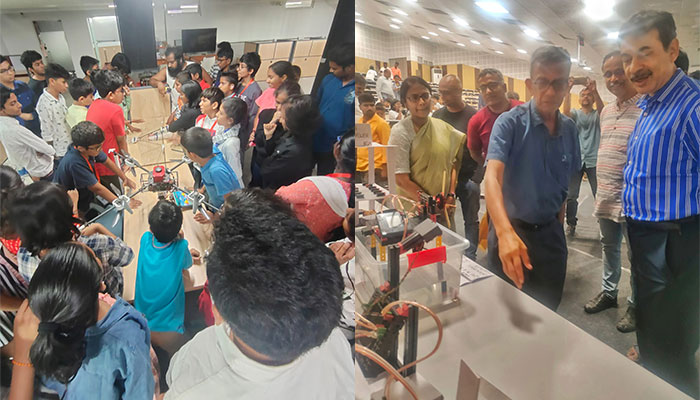
Witnessing The Real World
With an emphasis on the socio-emotional learning (SEL) component that focuses on emotional growth and nourishment, the program kicked off every morning with a SEL session while culminating the day with field games. The students gained exposure to real world problems like pollution and benefitted by witnessing the operations of the pollution monitoring project on campus, explored the Smart City Living Lab and saw first hand the challenges involved in the creation of smart cities. On June 4th, World Environment Day was celebrated with a poster making activity along with an opportunity to visit a 17th century heritage site, Bansilalpet stepwell. The stepwell which had fallen into neglect and become a garbage dump underwent a recent renovation bagging the prestigious Big 5 Construction Impact award in Dubai. Another field trip to the National Remote Sensing Centre at Mojerla was made fruitful with the demo of a weather balloon experiment.
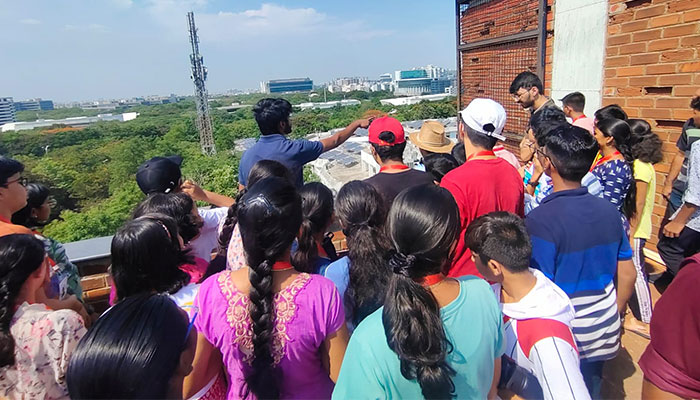
Learning By Doing
On campus, the program participants got a shot at working hands-on at the Makers Lab, a dedicated prototyping facility that has been set up with the support of the Department of Science and Technology (DST). “Problem statements such as a contactless door opener and a phone holder that could double up as a charger were given to them. They used laser cut machines and other equipment at the Makers Lab and created the products under supervision,” says Sthita. Through interactions with various startups located at CIE and T-hub such as Switcheko – a startup that makes a range of sustainable products, and Marut Drones – a drone tech provider that creates sustainable solutions for social and ecological issues, the students were exposed to inspirational stories that could motivate them to pursue entrepreneurship in the future. One of the highlights of the program was the conduct of a Hackathon where the students were encouraged to present tech-based solutions to environmental problems.
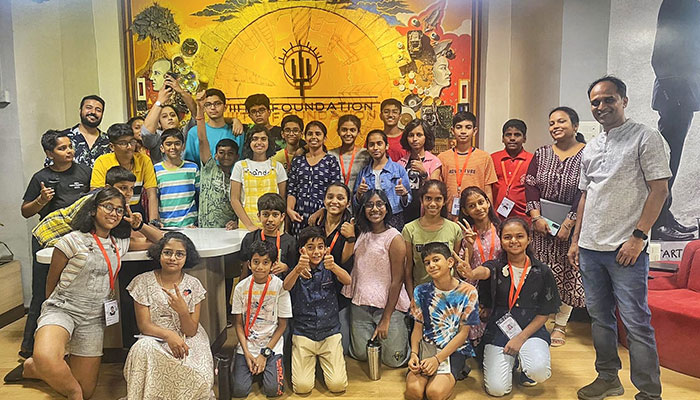
Valedictory Program
The program drew to a close in the presence of the chief guest Shri Jayesh Ranjan, IAS, Secretary, IT, Government Of Telangana and the Guest of Honor Prof CV Jawahar, Dean R&D, IIITH. Distinguished guests from various fields were invited such as the Assistant Commissioner from Jawahar Navodaya Vidyalaya Samiti, Mahadevan Venkatakrishnan, Head of school education, TCS Ion and so on. Emphasising that actions speak louder than words, Shri Jayesh ji exhorted the students to apply their learnings at individual levels once they went back home. In what was perhaps a testimony to how the 1% rule matters to ecology, Shri Jayesh ji who confessed to never accepting bouquets at events, remarked that he made an exception this time around not in the least because it was presented by a little child but for the fact that it came wrapped in paper and not plastic.
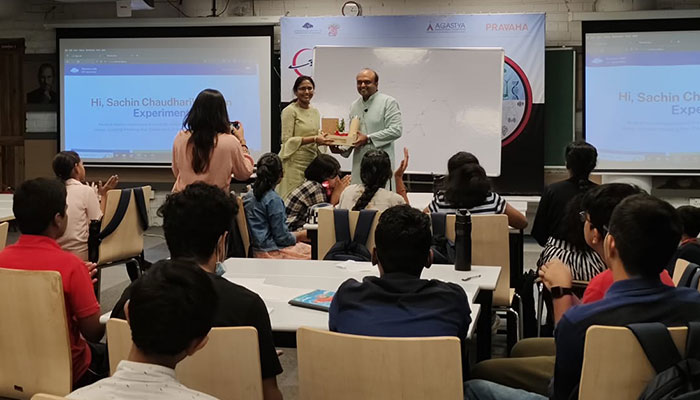

Sarita Chebbi is a compulsive early riser. Devourer of all news. Kettlebell enthusiast. Nit-picker of the written word especially when it’s not her own.

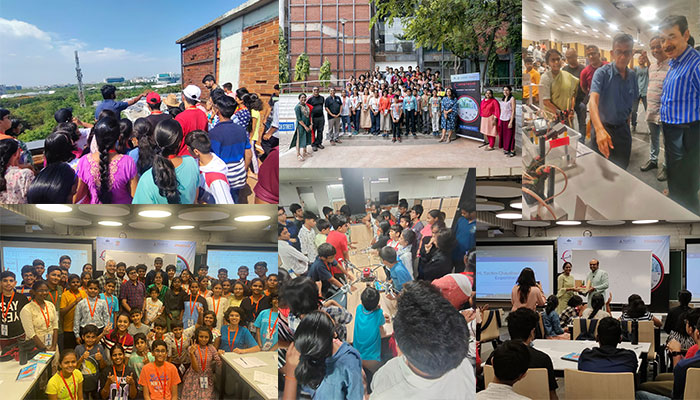
Hello I would like to know how we can apply for this program
Maruthi Kiranmayee Ramayanam says: